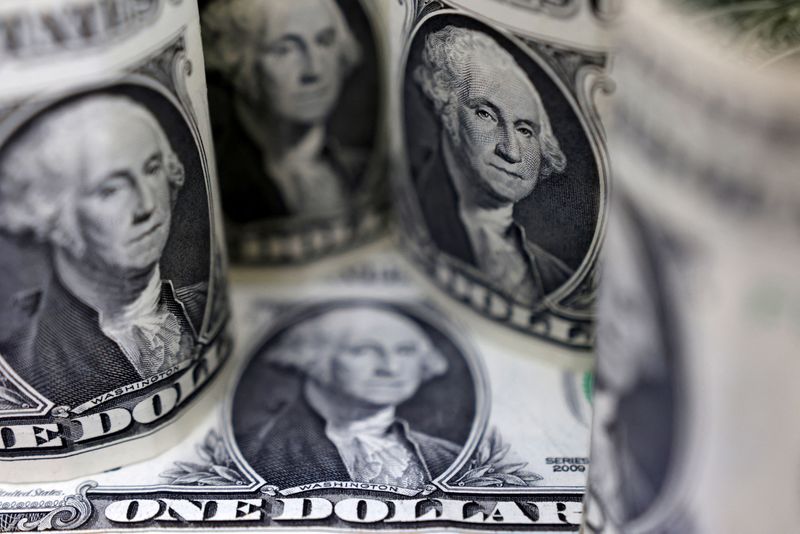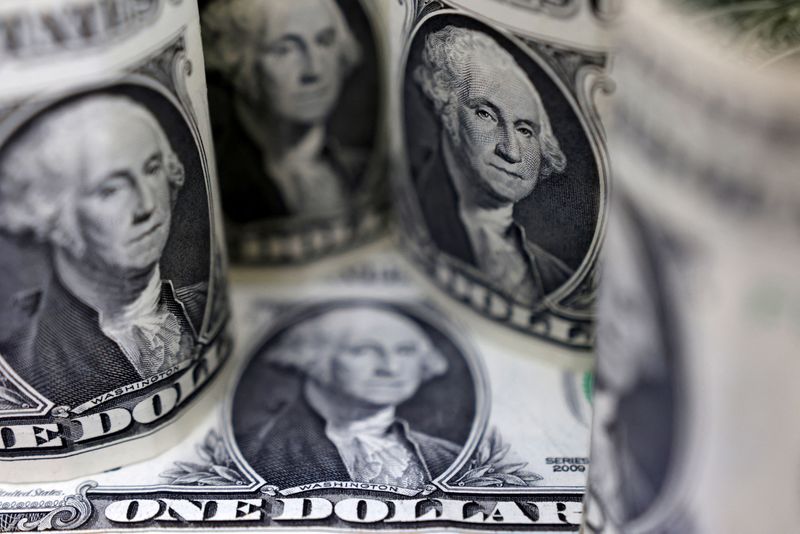Forex
In the Market: How the US is daring the world to find a dollar alternative

By Paritosh Bansal
(Reuters) -The United States is merrily chipping away at the pillars that hold up the dollar as the world’s reserve currency, with the latest blows coming from some powerful Americans questioning the rule of law following the conviction of Donald Trump.
In doing so, it is effectively daring the rest of the world to find an alternative – and so far, it appears to be winning.
The attacks on the legal system in the aftermath of former President Trump’s conviction follow other moves that are seen by some as the United States throwing down the gauntlet to the rest of the world.
The country has radically increased the use of sanctions as a punitive foreign policy tool. And it is adding on an immense amount of debt, leaving hapless foreigners who seek the safety and depth of its markets to fund its excesses.
Over the past three weeks, I have been asking financial services executives, global investors and other experts in Asia and the United States how long they think the Americans can keep at it without meaningful blowback. Several of the sources requested anonymity to speak candidly about the situation.
These conversations showed consternation is growing, both at home and abroad, about the consequences of U.S. hubris. But despite trying, no one so far has been able to find a credible alternative or expects one to emerge anytime soon, and they have partly themselves to blame.
In Asia, for example, people are asking with increasing urgency what’s their ‘America plus 1’, as they search for ways to reduce their U.S. exposure and boost non-dollar trade flows.
But attempts to build such systems are slow-going or haven’t gotten traction. And rising authoritarianism, threats to individual and property rights and geopolitical tensions have meant that even if U.S. assets are less attractive than they were before, other options are worse.
A recent survey, for example, shows central bank reserve managers plan to increase their dollar holdings over the next 12-24 months as the rise in global geopolitical tensions and need for liquidity draw them to the currency.
“Perhaps ironically, the U.S. dollar’s strength is, in part, due to its near-unchallenged safe-haven status,” said Steve H. Hanke, a professor of applied economics at Johns Hopkins University, who served on former President Ronald Reagan’s Council of Economic Advisers. “That said, most investors don’t understand geopolitics and the dangers that lurk below the surface – until it’s too late.”
DOLLAR’S DOMINANCE
At its core, the dollar’s dominant role in the world draws from the United States’ democratic principles. It is supported by the massive size of its economy, the depth of its markets, and the strength of its institutions and the rule of law.
The belief in democracy runs deep. Last week, I asked U.S. Securities and Exchange Commission Chair Gary Gensler, who has been in government since 1997, whether partisan politics had made the job of officials like him harder. A conservative-leaning U.S. appeals court had struck down one of his signature initiatives that morning.
“I believe in this constitutional system that we have. It’s messy,” Gensler said. “It’s democracy.”
Nevertheless, the messiness is testing some of the underpinnings of the dollar’s global appeal.
Attacks on the U.S. legal system have increased after the Trump verdict in a New York court. Florida Governor Ron DeSantis, for example, called it a “kangaroo court” on the social media platform X, saying “the verdict represents the culmination of a legal process that has been bent to the political will of the actors involved.”
A major investor based in Asia said potential threats to U.S. institutions were also worrying. Any debasing of the Federal Reserve’s authority — as Trump allies are reportedly contemplating — would affect the dollar’s credibility, the investor said, adding that such a development could see a double-digit depreciation of the currency.
Trump’s campaign for his Republican presidential bid has played down such reports of what conservative groups might be planning.
THICKET OF SANCTIONS
A senior New York-based financial services executive who was traveling in Asia said he is hearing from clients who think the U.S. and Western financial policy is “undermining the dollar and the Western financial system more broadly.”
He pointed to an “ever expanding thicket of sanctions” as one reason.
And the West is pushing the envelope further. The financial executive said the discussion that the West might seize some $300 billion of sovereign Russian assets that were blocked over Ukraine undermined the United States’ safe haven status. “The West crossed a Rubicon there,” the executive said.
An October 2021 Treasury Department review of sanctions found such designations had increased to 9,421 by that year from 912 in 2000. It noted at the time that “American adversaries — and some allies — are already reducing” their use of the dollar.
An Asia-based investor said he was watching another court case closely to test the strength of the rule of law: ByteDance’s challenge of a U.S. ban on TikTok. He is watching for the evidence that the U.S. government would produce to back up claims of the app being a national security threat.

If no proof is publicly offered, then it would “feel that the checks and balance, the independence of the legal system, may not be there — at least in this case,” the investor said.
But then he added that even that may not turn him away from the United States. It’s still more independent and better than many other places, he said.

 Forex3 years ago
Forex3 years agoForex Today: the dollar is gaining strength amid gloomy sentiment at the start of the Fed’s week

 Forex3 years ago
Forex3 years agoUnbiased review of Pocket Option broker

 Forex3 years ago
Forex3 years agoDollar to pound sterling exchange rate today: Pound plummeted to its lowest since 1985

 Forex3 years ago
Forex3 years agoHow is the Australian dollar doing today?

 Cryptocurrency3 years ago
Cryptocurrency3 years agoWhat happened in the crypto market – current events today

 World3 years ago
World3 years agoWhy are modern video games an art form?

 Commodities3 years ago
Commodities3 years agoCopper continues to fall in price on expectations of lower demand in China

 Economy3 years ago
Economy3 years agoCrude oil tankers double in price due to EU anti-Russian sanctions





















